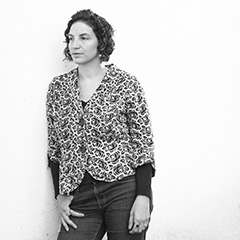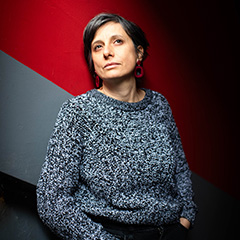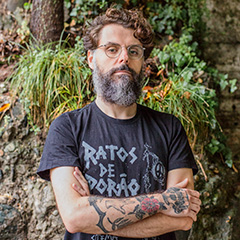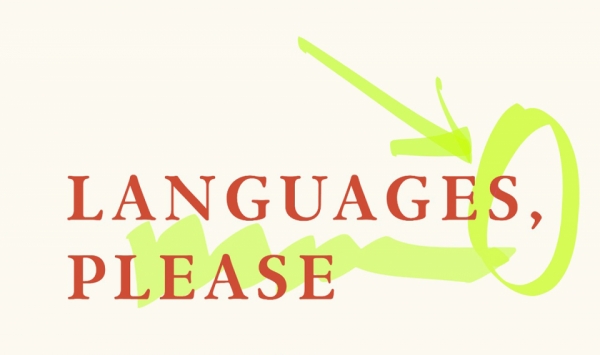Open Call UNIDEE Residency Modules: LANGUAGES, PLEASE / Summer Season 2025
UNIDEE Residency Programs and Fondazione Pistoletto Cittadellarte are pleased to announce an open call for applications for the first two residency modules in the programme Languages, Please, curated by UNIDEE Visiting Curators Nina Fiocco and Gaia Martino.
Languages, Please is an invitation to a collective series of rehearsals that explores languages as geopolitical spaces of dispute, narratives, and encounters. It is a call to engage with the porosity of our bodies in action and the narratives that can infuse and strengthen our practice of remaining polyphonic, amid the crumbling circumstances of the present.
To meet in a language embraces the paradox of feeling foreign but inside the language, consciously rejecting to be bound by borders and rules that the language itself may impose. The fragility and fleeting temporality of this process embody the very essence of the community as a political space: a plurality of possibilities forged by the acceptance of implicit differences and affective responses that sharing a language fosters in each of us. What is incomprehensible yet invisible—uncoded, unseen and unheard—is just as vital as what is comprehensible and visible. Moving beyond the individual existence as an isolated experience, our human and more-than-human bodies are constantly engaged in negotiating ecological relationships to defend our right to remain plural, precarious and complex. This is a call to delve into what it could mean to engage with sustainable acts of storytelling, reception, and the reclamation of spaces of coexistence—an ongoing, heterogeneous multiplicity of stories so far, in which collective imaginaries emerge from the reorganisation of the senses, rewriting and acting for justice, rather than from resonance or empathy. It is about breaking the habit of synthesis, shifting our attention from the stories that worlds tell us to the intricate micro-processes that compose these stories—memories, muscles, and multiple interwoven connections occurring at once.
The UNIDEE Modules programme is a short-term residency format for selected residents. Participants will have the opportunity to cohabit at Cittadellarte and engage in an immersive, week-long residency, delving into their ongoing practice alongside peers, invited mentors, and guests. Discursive and material frameworks will intertwine, fostering a dynamic space where collective practice unfolds. Each module is interwoven within the 2025-2026 Modules program, threading together the fabric of Languages, Please.
The Summer 2025 modules are curated by UNIDEE Visiting Curator with invited mentors: visual artist and writer Verónica Gerber Bicecci with singer, composer and vocal researcher Meike Clarelli, and researcher, sound artist, and educator Pedro Oliveira with performer, composer and musician Ece Canli.
To learn more about the project's context and objectives, please refer to the complete curatorial framework here.
Module I – Summer 2025, The thing with commas, periods, dashes and parentheses will take place from 9 to 13 June, and it is led by mentor Verónica Gerber Bicecci and guest Meike Clarelli.
The module will focus on the supposed silence of punctuation. If we could listen to commas, periods, dashes or parentheses; if we could talk to semicolons, colons, hyphens, question marks and exclamation points, what would they tell us? How would they translate the world from their own place? How does punctuation think about writing? Researcher Jennifer DeVere Brody says that punctuation was first considered a “servant”, then a chaperone, and finally an assistant to texts–always a female worker with a minor place in the shaping of meaning. Through teamwork exercises on observation, listening, walking and other activities, the workshop aims to embody possible answers to all these questions. Attendees will create performance pieces as well as scores, exploring their own relationship with punctuation marks.
Module II – Summer 2025, Unknowing Listening / Transfluent Aurality will take place from 16 to 20 June, and it is led by mentor Pedro Oliveira and guest Ece Canli.
The workshop explores listening and aural practices at the limits of what knowledge is and can be. In a continuous process of doing and undoing—what we know, what we think we know, and what we might not know—participants will engage in a transdisciplinary exercise of thinking with and through listening as a mode of redefining what it means to "know" something, to "understand" the world, and to act in the world. The main goal is to rehearse modes and practices that engage with other-than-human worlds in non-extractive and non-utilitarian ways—practices that give as much as they take, and that engage without the precondition of making things transparent and legible. It brushes against the idea that the world is something external to ourselves, and thus can be properly organized in a system of understanding that is fixed, nameable, classifiable; capable of having its resources extracted, packaged, and commodified. The failed promises of utilitarianism and extractivism will be discussed, inviting participants to engage with the radical exercise of imagining other possible worlds through poetic, artistic, activist, and scholarly work.
We aim to invite a group of up to 12 residents to take part in each module. The programme is open to international participants of all backgrounds, whose engagement sits anywhere across the broad spectrum of cultural practice and research, with no restriction regarding disciplines, media or methodologies of work. Applications from artists, musicians, performers, curators, storytellers, writers, theorists, designers, activists, all are welcome and encouraged. We welcome applications from both individuals and collectives. If applying as a collective, please specify the number of participants and the nature of your collaborative practice.
The selection of participants will be guided by the resonance between the poetics, concerns, and inquiries present in the applicant’s work and those articulated by the curatorial framework of the UNIDEE Residency Modules 2025-26, and the core themes of each module. Additionally, consideration will be given to the applicant’s interest to contribute to a program-based residency rooted in processes of active exchange and participation.
The Residency Modules will take place at Fondazione Pistoletto Cittadellarte, in Biella, Italy.
The UNIDEE and Cittadellarte spaces will host a large part of the programme, while further opportunities for exploring the urban and rural landscape of Biella and its immediate surroundings will be offered.
Participants will be accommodated within the premises of Cittadellarte, in single rooms equipped with bedding and towels, and with the use of shared bathrooms. In case of participation in the workshop as a collective, they will be accommodated in a shared room. The residential spaces offer basic cooking facilities and communal resting areas. Arrival is expected in the afternoon on the day before the module begins, with departure scheduled for the afternoon of the day following the module’s conclusion. We are happy to welcome participants with children and/or small pets, ensuring a comfortable and inclusive environment for all.
We are committed to meeting to the best of our ability any accessibility requirements an attendee may have; this will be discussed individually with prospective residents.
N.B: English will be the common ground for interaction within the residency module, yet the work will not be confined to it. Languages will be approached as open territories, and participants will be invited also to engage with expanded, non-codified forms of communication, hybrid languages, and multiple configurations of interaction shaped by backgrounds, interests, and practices of all individuals within the group.
Further information regarding practicalities and FAQ available here.
To ensure sustainability to the UNIDEE Residency Module Programs, the participation fee follows a participatory method: each selected resident contributes with a fee based on their financial context, monthly income, and personal circumstances at the moment of the module. The suggested fee is 280 euros per module, covering accommodation at Cittadellarte and administrative expenses. After the selection process, participants will be invited to share their proposed contribution.
A limited number of partial bursaries to cover travels are made available to those who would not otherwise be able to participate. Please make sure to indicate in your application if you wish to be considered for this opportunity.
Residents will be required to arrange and cover expenses for their travel to/from Biella and for the food/living costs whilst in Cittadellarte.
The team at UNIDEE remains at your disposal to support you in the visa application process and to offer guidance and recommendations with travel arrangements. Additionally, the team will provide you with any documents you may need should you decide to pursue other funding opportunities through your local art councils or via international platforms / funding bodies.
We accept applications through https://form.jotform.com/250914120193347, which includes detailed instructions for the application process. Applicants will receive a confirmation email once their submission has been successfully received.
Please note: Applicants must indicate their choice of one of the two modules and tailor their response accordingly. If they wish to apply for both modules, two separate applications, each appropriately written, are required.
Deadline for submissions is 27 April 2025, 23:59 (CEST).

Verónica Gerber Bicecci is a visual artist who writes. Her artistic quest —the interface between the word and the image— began with the series of drawings Diagrams of Silence, an exercise in visual exhumation based on the punctuation of various poems and the book Mudanza (Moving Out), a collection of essays about writers who deserted conventional literature to become visual artists. She recently inaugurated the solo exhibition ¿Quiénes son esas de allá abajo (Who are these below?), curated by Lorena Peña Brito at Impronta Casa Editora and published the essay «Las cosas que escriben» («The things that write») in the anthology of texts Un gesto de tiempo (A time gesture), edited by Gris Tormenta. She currently coordinates, together with Guillermo Espinosa Estrada, Taller Diagonal, a permanent space of accompaniment for diverse writings. Lives and works in Mexico City.
https://www.veronicagerberbicecci.net/

Meike Clarelli - singer, music therapist, composer and vocal researcher with a diverse background, Meike Clarelli ranges from music to psychophony, theater, and poetry. She is founder and singer of the groups La Metralli and Dueventi, collaborator of the Collettivo Amigdala, and director of the women's choirs Le chemin des femmes and Core Voci Indisciplinate. She teaches singing and music through an original method she created called Sensitive Singing. She graduated as a music therapist with Psychophonetic address in 2024 at the Accademia Internazionale di Psicofonia, Mantua (IT).

Pedro Oliveira is a researcher, sound artist, and educator committed to an anticolonial study of listening and its intersections with violence at the European border. His current research focuses on the long histories of technical and machinic listening in Germany, with particular attention to the aesthetic and material articulations of the “dialect recognition software,” a tool used since 2017 in asylum procedures for undocumented individuals. Currently he is a Guest Faculty in Sound Studies and Sonic Arts at the Universität der Künste Berlin, and previously he was a Research and Arts Fellow at the Leuphana Institute for Advanced Studies in Culture in Society, a Postdoctoral Fellow at the Helsinki Collegium for Advanced Studies, and a lecturer in Musicology and Media Studies at Humboldt-Universität zu Berlin. He also worked as a teaching and research associate in Media and Cultural Studies at Heinrich-Heine-Universität Düsseldorf. His work was exhibited and performed at the Akademie der Künste Berlin, Send/Receive Festival Winnipeg, CTM Festival, Festival Novas Frequências, Museo del Mare Palermo, among others. His artistic residencies include the AI Anarchies program of the Junge Akademie der Künste Berlin in partnership with ZK/U, the Max-Planck Institute for Empirical Aesthetics in Frankfurt, IASPIS, and the Elektronmusikstudion (EMS) in Stockholm. He is a founding member of the research platform Decolonising Design and hold a PhD from the Universität der Künste Berlin.
 Ece Canlı is a Turkish-born, Portugal-based artist, musician and researcher. Her main tools of investigation include voice, sound, text and space. In her artistic practice, she adopts extended vocal techniques, extralinguistic expressions, counterfactual narrativity, and myths as ways of exploring the limits and possibilities of the sounding body in order to re-articulate marginalised narratives. She played in festivals and venues including Fabric Arts Festival, Les Siestes Electronique, SINSAL and Picnic Sessions, Festival Novas Frequências and INDEX, Warehouse9, Tremor, and Serralves Museu among others. Her academic work sits at the intersection of decolonial queer feminist epistemologies, material regimes and body politics. She holds a Ph.D. in Design from University of Porto and and she is a founding member of the research collective Decolonising Design Group.
Ece Canlı is a Turkish-born, Portugal-based artist, musician and researcher. Her main tools of investigation include voice, sound, text and space. In her artistic practice, she adopts extended vocal techniques, extralinguistic expressions, counterfactual narrativity, and myths as ways of exploring the limits and possibilities of the sounding body in order to re-articulate marginalised narratives. She played in festivals and venues including Fabric Arts Festival, Les Siestes Electronique, SINSAL and Picnic Sessions, Festival Novas Frequências and INDEX, Warehouse9, Tremor, and Serralves Museu among others. Her academic work sits at the intersection of decolonial queer feminist epistemologies, material regimes and body politics. She holds a Ph.D. in Design from University of Porto and and she is a founding member of the research collective Decolonising Design Group.
